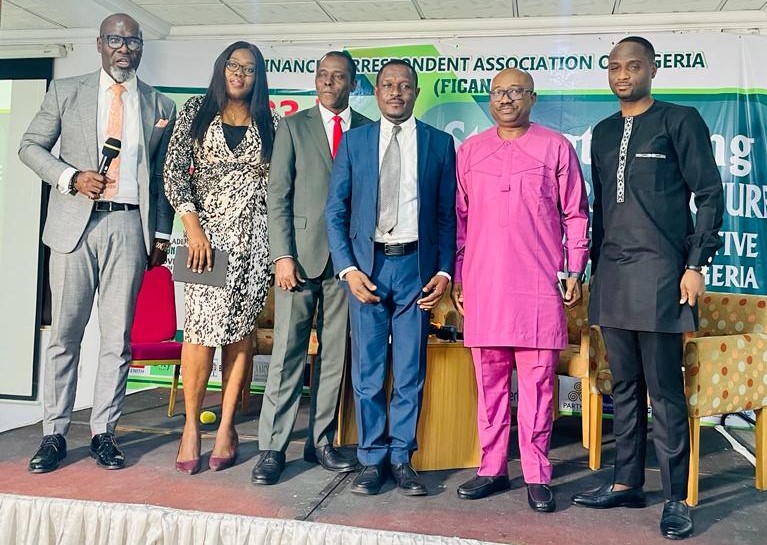Experts in Nigeria’s Financial Sector have emphasized the role of multidimensional collaboration amongst Stakeholders as key to enhancing the nation’s payment systems. Vice Chairman of the Nigerian Communication Commission (NCC) Prof Umar Danbatta, made the statement at the just concluded 2023 annual conference of the Finance Correspondents Association of Nigeria (FICAN) held in Lagos. He was represented by a Deputy Director at the commission, Engr Anthony Ikemefuna.

Speaking on the theme of the conference ‘Strengthening Digital Infrastructure for Efficient Innovative Payment System in Nigeria’, Professor Danbatta emphasized that building a robust and inclusive digital payment ecosystem that is beneficial to the economy is one that requires concerted efforts, investment, and adaptability. According to him, this is crucial in strengthening the digital infrastructure for efficient and innovative payment systems in Nigeria.
He explained that a critical aspect of this collaboration is one requiring improved synergy between the NCC and financial regulators such as the Central Bank of Nigeria (CBN). Such cooperation according to him would ensure the harmonization of policies and regulations pertaining to digital payments and Telecommunications and in turn providing a regulatory environment that enhances innovation and growth.
Professor Danbatta further stressed the need to encourage partnerships between financial institutions, Telecom operators, and FinTech companies in developing as well as delivering innovative digital payment solutions. According to him, Nigeria needs to leverage the expertise and resources of the private sector to expand and improve digital infrastructure.
“The government should take a leading role in promoting digital payments by setting a clear vision and providing support. Implement e-government initiatives to promote digital payments for public services and benefits distribution,” Danbatta stressed.
He called on Telecom operators to support financial inclusion initiatives by partnering with Banks and FinTech companies to offer mobile banking and payment services to unbanked and under-banked populations.
Meanwhile, head of digital banking, United Bank for Africa, Mr Olukayode Olubiyi, who also made a presentation at the event stressed that inadequate infrastructure posed one of the greatest challenges to Nigeria’s electronic payment system emphasizing that stable power sources and robust IT infrastructure are crucial and addressing these challenges requires a collaborative effort.

He stressed the need for uniformity in banking applications across the industry to reduce the occurrence of failed or delayed payments emphasizing the importance of collaboration amongst financial institutions, FinTech companies, government agencies, and regulatory bodies. He emphasized that policy, regulation, and collaboration are essential elements in mitigating the frictions currently experienced in Nigeria’s financial service sector.
“Ultimately, it comes down to policy, regulation, and collaboration. If parties are willing to collaborate, many of the frictions currently experienced in the Nigerian financial service sector can be mitigated.”
“Uniformity in banking applications across the industry could significantly reduce the occurrence of failed or delayed payments,” he added.
“During the period of cash scarcity earlier this year, banks faced unprecedented e-payment failures, prompting the urgent need for technological infrastructure upgrades,” he noted.
Olubiyi noted that the failure of e-payment channels on such a scale compelled customers to wait for banks’ networks to stabilize before completing their transactions. And the challenge of failed transactions in Nigeria’s payment systems necessitates a collaborative effort among industry stakeholders and the implementation of appropriate policies and regulations.

According him, cutting edge technology, stringent security measures, and seamless integration with various payment platforms and financial institutions will go a long way in enhancing a robust payment system in the country.
“To combat fraud, it is imperative for the government, private sector organizations, and international partners to engage in strong and cohesive collaboration. Sharing intelligence and pooling resources will significantly contribute to the fight against cybercrime.
“Furthermore, this collaboration can extend to investments in cybersecurity infrastructure, including cybersecurity training facilities, incident response centers, and cybersecurity research and development centres,” he reasoned.
Olubiyi also highlighted the importance of collaboration amongst cyber security companies in combating fraud. He called for the sharing of intelligence and pooling of resources among the government, private sector organizations, and international partners, particularly in the development of cybersecurity infrastructure.
Speaking earlier, Chima Nwokoji, Chairman of the Finance Correspondents Association of Nigeria (FICAN) noted that the challenges witnessed in the country’s payment system during the cash scarcity provided a window of opportunity for the banking system to be proactive and inventive. This, he said, would enable them to reap the benefits provided by electronic payments.

“As banks and FinTechs are expanding their financial services portfolios to capture the unbanked and semi-banked, they should not only be expanding their digital infrastructure, but also making it more sophisticated to ensure seamless transaction and safety of funds.
“In its ‘Nigeria Development Update (JUNE 2023) the World Bank pointed out that Nigeria’s digital and financial infrastructure is inadequate to support a swift transition to a cashless economy.
He quoted the multilateral as saying, “The lack of adequate digital and financial infrastructure and processes to support a swift transition to a cashless economy— coupled with the fact that only 40 per cent of adults have a bank account—further exacerbated the situation. The cash shortage resulted in a black market for new notes, inflating overall transaction costs.”
The World Bank’s assessment, as cited by Nwokoji, underlines the need for more sophisticated digital and financial infrastructure to support the transition to a cashless economy. The report highlighted that inadequate infrastructure, combined with limited access to bank accounts, increased the challenges faced during the cash shortage.















